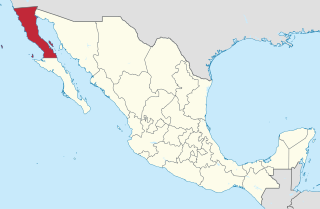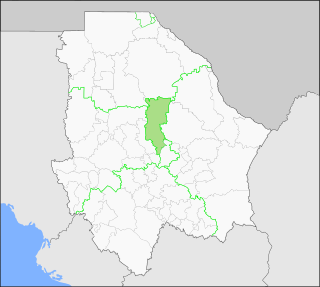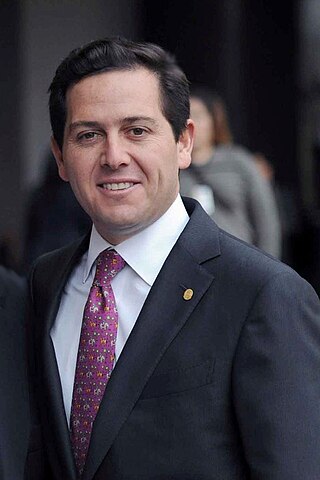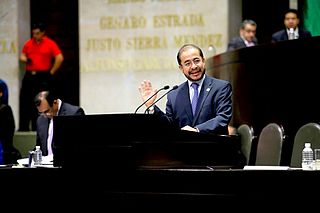
Baja California, officially the Free and Sovereign State of Baja California, is a state in Mexico. It is the northernmost and westernmost of the 32 federal entities of Mexico. Before becoming a state in 1952, the area was known as the North Territory of Baja California. It has an area of 70,113 km2 (27,071 sq mi) and comprises the northern half of the Baja California Peninsula, north of the 28th parallel, plus oceanic Guadalupe Island. The mainland portion of the state is bordered on the west by the Pacific Ocean; on the east by Sonora, the U.S. state of Arizona, and the Gulf of California; on the north by the U.S. state of California; and on the south by Baja California Sur.

The Congress of the Union, formally known as the General Congress of the United Mexican States, is the legislature of the federal government of Mexico consisting of two chambers: the Senate of the Republic and the Chamber of Deputies. Its 628 members meet in Mexico City.

The Chamber of Deputies is the lower house of the Congress of the Union, the bicameral parliament of Mexico. The other chamber is the Senate. The structure and responsibilities of both chambers of Congress are defined in Articles 50 to 70 of the constitution.

Ensenada is a city in Ensenada Municipality, Baja California, situated on the Pacific Coast of Mexico. Located on the Bahía de Todos Santos, the city had a population of 279,765 in 2018, making it the third-largest city in Baja California. The city is an important international trade center and home to the Port of Ensenada, the second-busiest port in Mexico. Ensenada is a major tourist destination, owing to its warm Mediterranean climate and proximity to the Pacific Ocean, and is commonly known as La Cenicienta del Pacífico.

The Labor Party is a political party in Mexico. It was founded on 8 December 1990. The party is currently led by Alberto Anaya.

The municipality of Ensenada is the fourth-largest municipality in Mexico with a land area of 19,526.8 km2 (7,539.3 sq mi) in 2020, about the same size as Hidalgo state and larger than five Mexican states.

The governor of Baja California represents the executive branch of the government of the state of Baja California, Mexico, per the state's constitution. The official title is "Free and Sovereign State of Baja California", and the position is democratically elected for a period of 6 years, and is not re-electable. From 1953 to 2019, the governor's term began November 1 of the year of the election and finishes October 31, six years later. To coincide with the federal elections, the law was changed, decreeing there would be an election in 2019, another in 2021, and yet another in 2024 before reverting to a six-year term.

José Guadalupe Osuna Millán is a Mexican economist and politician member of the National Action Party (PAN) who served as Governor of Baja California.
Gilberto Antonio Hirata Chico is a Mexican politician who served as a federal deputy in the Chamber of Deputies representing the Third Federal Electoral District of Baja California and as a state deputy in the XIX Legislature of the Congress of Baja California. He formerly served as the Presidente Municipal of the Ensenada Municipality.
Federal Highway 1D is a tolled part of the Mexico Federal Highways, paralleling Fed. 1. There are two segments, one in the state of Baja California and another in the state of Baja California Sur.
The federal electoral districts of Mexico are the 300 constituencies or electoral districts into which Mexico is divided for the purpose of federal elections. Each district returns one federal deputy (diputado), who sits in the Chamber of Deputies, the lower house of the Federal Congress. An additional 200 deputies are elected by proportional representation from the five electoral regions.

The Sixth Federal Electoral District of Chihuahua(VI Distrito Electoral Federal de Chihuahua) is one of the 300 Electoral Districts into which Mexico is divided for the purpose of elections to the federal Chamber of Deputies and one of nine such districts in the state of Chihuahua.

Pedro Pablo Treviño Villarreal is a Mexican lawyer and politician who served as state secretary of Labor in Nuevo León from 2010 until 2012. federal deputy for the 2012–2015 period by Nuevo León's 12th Federal District and Chairman of the Committee on Budget and Public Accounts in the 62nd Legislature of the Mexican Congress. Managing Director of Lotería Nacional para la Asistencia Pública and Pronósticos para la Asistencia Pública until September, 2017. Currently, he is President of PRI's State Steering Committee in Nuevo León.

Roberto Gil Zuarth is a Mexican politician affiliated with the PAN. He was Undersecretary of the Interior. He also served as Deputy between 2009 and 2011 during the 61st Legislature. He contended in 2010 for the presidency of the National Action Party against Gustavo Madero Muñoz. He was Private Secretary to Mexican President Felipe Calderón. He currently serves as Senator of the LXIII Legislature of the Mexican Congress. Since 1 September 2015 he is the President of the Mexican Senate.

Jaime Bonilla Valdez is a Mexican politician and entrepreneur who served as the Governor of Baja California from 2019 to 2021. A member of the National Regeneration Movement party, he has been a Federal Congressman and a Senator of the Republic.
Marco Antonio García Ayala is a Mexican politician affiliated with the Institutional Revolutionary Party. He is a federal deputy representing Baja California and the first electoral region in the LXIII Legislature of the Mexican Congress.

Social Encounter Party was a Mexican conservative political party established on the national level in 2014 and dissolved in 2018. It was part of the coalition Juntos Haremos Historia with the National Regeneration Movement and Mexico's Labor Party for the 2018 Mexican election.

The 2010–2015 Plurinational Legislative Assembly of Bolivia was the first class of the Bolivian legislature, also known as the Plurinational Legislative Assembly, to go by that name. The Assembly was controlled in both houses by the governing Movement for Socialism (MAS-IPSP), elected with a 2/3 supermajority, although some members later separated themselves from the majority. Just four incumbent members of the 2005–2010 Congress returned: Deputy Antonio Franco; Deputy Javier Zabaleta (MAS-IPSP/MSM); Senator René Martínez (MAS-IPSP), who was a deputy; and Senator Róger Pinto, previously of Podemos and now representing PPB-CN.

Hugo Eric Flores Cervantes is a Mexican politician and founder of the Social Encounter Party (PES). He was the party's national president and one of its eight federal deputies in the LXIII Legislature of the Mexican Congress. He currently is president of the party’s successor, the Solidarity Encounter Party.

Carol Mireya Montaño Rocha is a Bolivian lawyer, politician, and trade unionist who served as a member of the Chamber of Deputies from La Paz, representing circumscription 11 from 2015 to 2020. A member of the Movement for Socialism, Montaño entered politics as head of the party's youth wing in El Alto, later serving as secretary of organization of the Federation of Neighborhood Councils. Her party's alliance with El Alto's neighborhood councils facilitated Montaño's entry into the Chamber of Deputies. In 2009, she was elected as a substitute deputy representing La Paz's circumscription 14 and in 2014, she became one of the few ruling party parliamentarians to be presented for reelection, this time for a full seat.
















